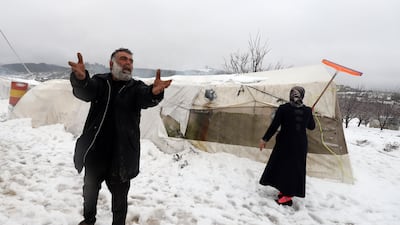The UN’s special envoy to Syria said on Wednesday that the war-torn country remains “trapped” and “divided” over how to pursue a viable political agreement.
Geir Pedersen said no substantive progress has been made to build a common political vision, and unfortunately, “that solution is not imminent”.
“The country remains de facto divided into several parts, with five foreign armies, multiple Syrian armed groups and [UN] Security Council-listed terrorists all active on the ground,” Mr Pedersen said.
He urged Syria's Constitutional Committee — a body consisting of 15 representatives from President Bashar Al Assad's government, the opposition and civil society — to reconvene and make more substantive progress in Geneva.
The special envoy has been asking the Syrian government, the opposition, regional states and other stakeholders what concessions they are willing to make in exchange for reciprocal actions on matters such as abductees, detainees, missing persons, humanitarian assistance and voluntary refugee returns.
“Our goal is to facilitate progress on several priorities in line with Security Council Resolution 2254, and we are urging all actors to work together in support of a UN-facilitated political process,” he said.
Resolution 2254 was unanimously adopted in December 2015 and calls for a ceasefire and political settlement in Syria.
Landmines still a threat in Syria — in pictures
Mr Pedersen said he will continue to engage with the Syrian parties to the conflict and will return to Damascus next month for meetings with Syrian Foreign Minister Faisal Mekdad and the government-appointed co-chairman of the Constitutional Committee, Ahmed Al Kuzbari.
Representatives from France, Germany, the UK and the US met Mr Pedersen on Tuesday in Geneva to reaffirm their “steadfast support” for his efforts to reach a political solution to the Syrian conflict.
They also expressed their commitment to “free and fair elections, and the need to build conditions for the safe, dignified and voluntary return of refugees and internally displaced persons, consistent with UN standards”.
Meanwhile, the UN’s Office for Humanitarian Affairs acting director of operations and advocacy provided on Wednesday an overview of the increasingly dire humanitarian situation in the country to the Security Council.
Ghada Eltahir Mudawi noted that 70 per cent of the population — about 15.3 million Syrians — require daily humanitarian assistance and said that winterisation funding met only 29 per cent of the needs this year.
Filippo Grandi and the Syrian refugee problem — video
In this dire context, she added, harsh winter weather is expected to compound the existing humanitarian needs in north-west Syria, which remain underfunded by 78 per cent.
According to the UN, 77 per cent of Syrian households are not able to meet their basic needs.
Richard Mills, the US deputy ambassador to the UN, called on the Syrian government to approve “cross-line” deliveries.
“The fact that no aid has reached Rukban from Damascus since 2019 is unconscionable, and it puts the lie to regime rhetoric that cross-line aid can be relied upon,” he said.
He accused several Security Council members of professing support for such aid while refusing to “acknowledge that the primary impediment to increased cross-line deliveries is the insecurity created by the Assad regime’s relentless conflict”.


